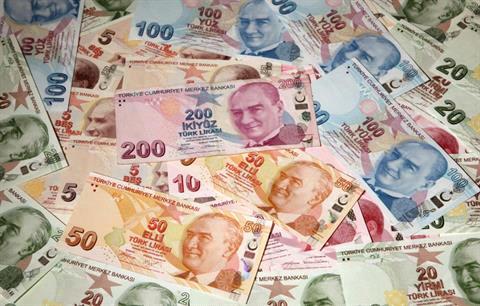Ammon News - (Bloomberg News) - Turkey’s central bank will probably have to intervene with an off-schedule rate increase after its Aug. 20 decision to raise the overnight lending rate was unable to contain a market sell-off, according to Citigroup Inc. Since the central bank boosted the upper end of its three-pronged rates corridor and left the other rates unchanged, the lira fell to a record and 10-year bond yields surged above 10 percent for the first time in 19 months. Turkey has led a jump in yields from Indonesia to Brazil in the past three months as speculation grew that the Federal Reserve would curb stimulus.
Turkey, which started using an interest-rates corridor in 2011 to stabilize the lira and rein in inflation, has spent $7.85 billion in reserves to shore up the currency. While the policy has helped deter speculative attacks on the lira, it’s no longer working, according to Luis Costa, a Citigroup emerging-markets currency strategist.
“We are probably coming very close to the point where the central bank will have to hike more aggressively,” and it’s “very likely” it will have to do so before the next rates meeting, Costa said by email Thursday. “The markets know the central bank does not have the same firepower in terms of foreign-exchange interventions, and that leaves rates as the only available stabilization tool.”
The central bank raised its overnight lending rate by 50 basis points to 7.75 percent three days ago and kept the benchmark one-week repo rate and overnight borrowing rate unchanged.
Less than 24 hours later, policymakers said they would implement additional tightening until further notice and sell at least $100 million in dollars daily. They ramped up sales to $350 million Thursday after an auction at the minimum rate of $100 million the day before. The bank is scheduled next to meet on rates Sept. 17.
The lira gained 0.4 percent to 1.9859 against the dollar in Istanbul, after sliding 2.4 percent in the previous two days, the biggest among 24 emerging markets tracked by Bloomberg worldwide. Turkey’s currency has depreciated 4.8 percent since policy makers resumed dollar auctions on June 11, the most in emerging Europe, the Middle East and Africa.
“An extraordinary decision may come if the market pressure continues,” Bulent Topbas, a strategist at Strateji Menkul Degerler AS in Istanbul, said in emailed comments yesterday. “The benchmark and the upper end of the corridor are obviously inadequate” to provide investors with sufficient yield to ensure continued capital inflows, he said.
